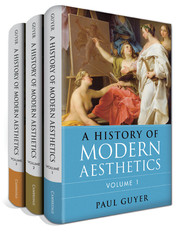Book contents
- Volume 1 The Eighteenth Century
- Frontmatter
- Epigraph
- Contents
- Acknowledgments
- Introduction
- 1 Prologue
- Part One Aesthetics in Britain, 1725–1800
- Part Two French Aesthetics in Mid-Century
- Part Three German Aesthetics between Wolff and Kant
- Part Four Kant and After
- Bibliography
- Index
- Volume 2 The Nineteenth Century
- Volume 3 The Twentieth Century
- References
Introduction
from Volume 1 - The Eighteenth Century
Published online by Cambridge University Press: 05 June 2015
- Volume 1 The Eighteenth Century
- Frontmatter
- Epigraph
- Contents
- Acknowledgments
- Introduction
- 1 Prologue
- Part One Aesthetics in Britain, 1725–1800
- Part Two French Aesthetics in Mid-Century
- Part Three German Aesthetics between Wolff and Kant
- Part Four Kant and After
- Bibliography
- Index
- Volume 2 The Nineteenth Century
- Volume 3 The Twentieth Century
- References
Summary
This work offers a history of philosophical aesthetics from the beginning of the eighteenth century to the beginning of the twenty-first. In the eighteenth century, I examine developments in Britain, France, and the German-speaking lands, not yet a unified country. At the end of the eighteenth century, the field of aesthetics was intensively cultivated in Germany, and throughout the nineteenth century that land retained its prominence in the discipline. This is reflected in the prominence of German aesthetics in my account of this period, although I consider British developments as well, and the emergence of the first serious American aesthetic theory at the very end of the century; I touch only fleetingly on some moments in French aesthetics in this period. I continue the story of German aesthetics into the twentieth century, indeed to the start of the twenty-first, but give much more space to American as well as British aesthetics in the last century (with one indispensable Italian adopted into British aesthetics). I do not discuss twentieth-century French aesthetics at all, although that subject would dominate many a discussion of twentieth-century aesthetics, especially if written by a literary theorist instead of by a philosopher, in part because I want to give adequate space to the rediscovery of many first-rate British and American aestheticians in the first part of the century who have been unjustly neglected since the enormous impact of Ludwig Wittgenstein on British and American philosophy, and in part because I believe that the emphasis on linguistic models and textuality that have dominated French aesthetics in the period of structuralism and poststructuralism has distracted attention from what I take to be the core subject matter of the discipline of aesthetics since its inception in the eighteenth century, namely, the study of the nature and value of aspects of the human experience of art and (sometimes) nature. Some of the late nineteenth- and early-twentieth century German philosophers who will be discussed here have also received little attention in recent years, and I want to give them room to breathe as well. That I do include some unusual figures as well as exclude some of the usual suspects is part of why I call this work, large as it is, only a, not the history of modern aesthetics.
- Type
- Chapter
- Information
- A History of Modern Aesthetics , pp. 1 - 29Publisher: Cambridge University PressPrint publication year: 2014



